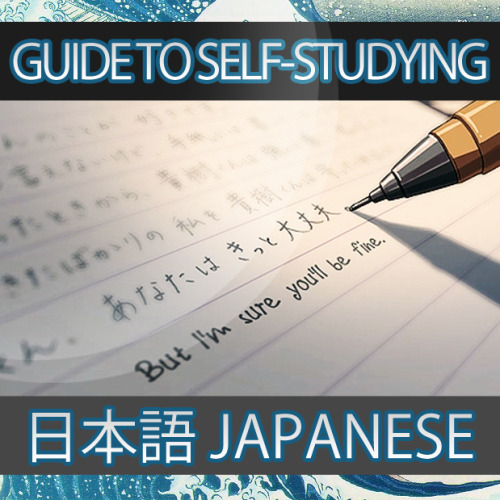The Ivy Lee Method For Peak Productivity
The Ivy Lee Method for Peak Productivity
At the end of each day, write down the six things you need to accomplish tomorrow. Do not write down more than six tasks and they can be anything. You choose.
Prioritise those six items in order of their true importance.
Tomorrow when you wake up and are fed and ready concentrate only on the first task. Work until the first task is finished before moving on to the second task.
Approach the rest of your list in the same fashion. At the end of the day, move any unfinished items to a new list of six tasks for the following day.
Repeat this process every day.
More Posts from Earthquakedeer and Others

Learn JLPT N4 Vocabulary: 足音 (ashioto)
![[417] かもめ | kamome | seagull](https://64.media.tumblr.com/c1e7646b3a14595b185694f8ea9cd4e0/tumblr_otlts67fAZ1v0vbxgo1_500.png)
[417] かもめ | kamome | seagull

Shibuya, Tokyo.

Japanese saying of the week!
泣き面に蜂 (なきつらにはち) When it rains it pours; salt in the wound; adding insult to injury
A saying for when something bad happens and then something ELSE bad happens on top of that.
泣き面(なきつら/nakitsura) crying face
に(ni) at, on, in
蜂(はち/hachi) bee, wasp
So literally bees at a crying face
that is BRUTAL
Like, you’re ALREADY crying

AND THEN BEES


“Darkness”
Sleepy vocab in German

der Schlaf - sleep schlafen - to sleep schläfrig - sleepy
die Müdigkeit - tiredness müde - tired gähnen - to yawn die Erschöpfung - exhaustion erschöpft - exhausted
Gute Nacht! - Good night! Schlaf gut! - Sleep well! Träum schön / süß! - Sweet dreams!
das Nickerchen - nap sich niederlegen - to lie down einschlafen - to fall asleep der Traum - dream träumen - to dream der Albtraum - nightmare sich hin und her wälzen - to toss and turn schnarchen - to snore ausschlafen - to sleep in aufwachen - to wake up aufstehen - to get up schlaftrunken - drowsy, sleepy (lit. “sleep drunk“) ausgeschlafen - well-rested wach - awake
das Schlafzimmer - bedroom das Bett - bed die Couch, das Sofa - couch, sofa die (Bett)decke - blanket das Kissen, der Polster (österr.) - pillow das Nachtkästchen, der Nachttisch - nightstand die Nachttischlampe - bedside lamp der Wecker - alarm clock
der Schlafmangel - sleep deprivation die Schlafstörung - sleep disorder die Schlaflosigkeit - insomnia das Schlafwandeln - sleepwalking

Guide to Self-Studying Japanese
A large proportion of Japanese learners self-study. Finding places to learn Japanese in a classroom environment can be difficult and expensive. Here’s a guide on how you can learn Japanese for free and from the comfort of your sofa.

When learning Japanese, the most important step is to learn Hiragana and Katakana, the writing alphabets of Japanese.
The best way I’ve found to do that is to make flashcards. Make sure you practice writing as well as recognizing them, this will not only be a great skill to have but will also reinforce the shapes in your mind.
Resources:
[Hiragana 42], the best guide I’ve found to learn the Hiragana (in a day!) [Hiranana and Katakana Quiz Site] [Kana Invaders Game] [Anki] An amazing program that will make sure you never forget any Kana….

The next step is to start learning vocabulary. Where can you find what to learn? Use a site like Memrise to find word lists (for example, there is a word list for all the vocabulary in starter textbooks like Genki), and use the amazing interface to learn them and keep them in your long term memory.
Resources:
[Memrise] as mentioned above to find and learn vocabulary lists. [Most Common Words List] [Anki] An amazing program that will make sure you never forget any Vocabulary….

While encountering vocabulary, you’re likely to be coming across super-complicated-looking Kanji. You can learn Kanji through Memrise as above, but there are some other websites that may be of interest.
Resources:
[Kanji Damage] A great site where you can learn Kanji through mnemonics. [WaniKani] by the same people who make TextFugu can help you learn Kanji from scratch. [Anki] An amazing program that will make sure you never forget any Kanji….

The next step is to apply that new vocabulary to grammar points and start making sentences.
If you can’t get your hands on textbooks like Genki, don’t fear! There are a lot of great online grammar resources.
Resources:
[TextFugu] a highly rated ‘online textbook’ which will guide you right from the beginning of learning Japanese. [Guide to Japanese] another online textbook with a lot of grammar points and excellent explanations.

So you probably started to learn Japanese because you have some interest in Japanese media. Time to start using it to your advantage!
Aside from the obvious watching Anime, J-dramas and films, why not try Reading Japanese News? Watching Japanese TV? Just make sure you are making these activities productive - note down new vocabulary, add them to Anki, and keep learning! It’s much easier to learn things you’re interested in.

The most important but difficult part of self-studying Japanese is getting your own compositions checked. Utilize all that grammar and vocabulary and write a short piece, it could be a diary entry or a short essay. Get it recorded for you by a native on RhinoSpike, and checked for grammar and consistencies on Lang-8.These sites also give you the chance to connect with Japanese natives, and perhaps start up some language exchanges!
For more resources, take a look at my Ultimate Resources List
Any more tips? Please submit them here!

Okachimachi, Tokyo.

thank you, wiktionary
Japanese lesson: In the morning
朝 (asa) - morning あくび (akubi) - yawn 疲れた (tsukareta) - tired 目覚まし時計 (mezamashi dokei) - alarm clock 布団 (futon) - bed 夜明け (yoake) - dawn 寝坊 (nebou) - oversleep 朝ごはん (asagohan) - breakfast 眠たい (nemutai) - sleepy 起きたくない (okitakunai) - I don’t want to get up.. おはよう (ohayou) - Good morning! ベッドから出られない (beddo kara derarenai) - I can't get out of bed.
-
 arewealloststars liked this · 1 month ago
arewealloststars liked this · 1 month ago -
 psalmieee liked this · 4 months ago
psalmieee liked this · 4 months ago -
 kennedypeterson liked this · 5 months ago
kennedypeterson liked this · 5 months ago -
 avlllr liked this · 7 months ago
avlllr liked this · 7 months ago -
 pghage liked this · 10 months ago
pghage liked this · 10 months ago -
 seaminoriswriting liked this · 1 year ago
seaminoriswriting liked this · 1 year ago -
 kru-sader liked this · 2 years ago
kru-sader liked this · 2 years ago -
 deadlysunlight liked this · 2 years ago
deadlysunlight liked this · 2 years ago -
 jayusisme liked this · 2 years ago
jayusisme liked this · 2 years ago -
 letscandyme liked this · 2 years ago
letscandyme liked this · 2 years ago -
 dariamarchinn liked this · 2 years ago
dariamarchinn liked this · 2 years ago -
 wiserandfighter liked this · 2 years ago
wiserandfighter liked this · 2 years ago -
 chiaroscurovoyant liked this · 2 years ago
chiaroscurovoyant liked this · 2 years ago -
 tranquilstudy reblogged this · 2 years ago
tranquilstudy reblogged this · 2 years ago -
 ultramarineiris liked this · 2 years ago
ultramarineiris liked this · 2 years ago -
 sannastudies reblogged this · 2 years ago
sannastudies reblogged this · 2 years ago -
 whimsicalthings liked this · 2 years ago
whimsicalthings liked this · 2 years ago -
 honeycombess reblogged this · 2 years ago
honeycombess reblogged this · 2 years ago -
 honeycombess liked this · 2 years ago
honeycombess liked this · 2 years ago -
 tojis-blog reblogged this · 2 years ago
tojis-blog reblogged this · 2 years ago -
 tojis-blog liked this · 2 years ago
tojis-blog liked this · 2 years ago -
 whoisjohngalt25 liked this · 3 years ago
whoisjohngalt25 liked this · 3 years ago -
 dreamersdontdie liked this · 3 years ago
dreamersdontdie liked this · 3 years ago -
 gemini-studies reblogged this · 3 years ago
gemini-studies reblogged this · 3 years ago -
 stawdynchill liked this · 3 years ago
stawdynchill liked this · 3 years ago -
 what-is-my-existance liked this · 3 years ago
what-is-my-existance liked this · 3 years ago -
 lovehappilyhomemaking liked this · 3 years ago
lovehappilyhomemaking liked this · 3 years ago -
 leticiacomth liked this · 4 years ago
leticiacomth liked this · 4 years ago -
 maryelizastudies reblogged this · 4 years ago
maryelizastudies reblogged this · 4 years ago -
 studyandgrow-blog1 liked this · 4 years ago
studyandgrow-blog1 liked this · 4 years ago -
 ohsunlight liked this · 4 years ago
ohsunlight liked this · 4 years ago -
 rafwinchester21 liked this · 4 years ago
rafwinchester21 liked this · 4 years ago -
 slutfordeathandsuffering liked this · 4 years ago
slutfordeathandsuffering liked this · 4 years ago -
 lia-elita liked this · 4 years ago
lia-elita liked this · 4 years ago -
 kafka3squeing liked this · 4 years ago
kafka3squeing liked this · 4 years ago -
 swirlyrose liked this · 5 years ago
swirlyrose liked this · 5 years ago -
 philostudyblr liked this · 5 years ago
philostudyblr liked this · 5 years ago -
 desideraga reblogged this · 5 years ago
desideraga reblogged this · 5 years ago -
 cermetsworld liked this · 5 years ago
cermetsworld liked this · 5 years ago -
 bettermess reblogged this · 5 years ago
bettermess reblogged this · 5 years ago -
 shotattheknightproductivity reblogged this · 5 years ago
shotattheknightproductivity reblogged this · 5 years ago
Just a person learning Japanese. Self-learner. If you're also studying Japanese and want to practice with someone (and you're also very much a beginner) then message me! はじめまして! さびーなです。よとしく!
196 posts